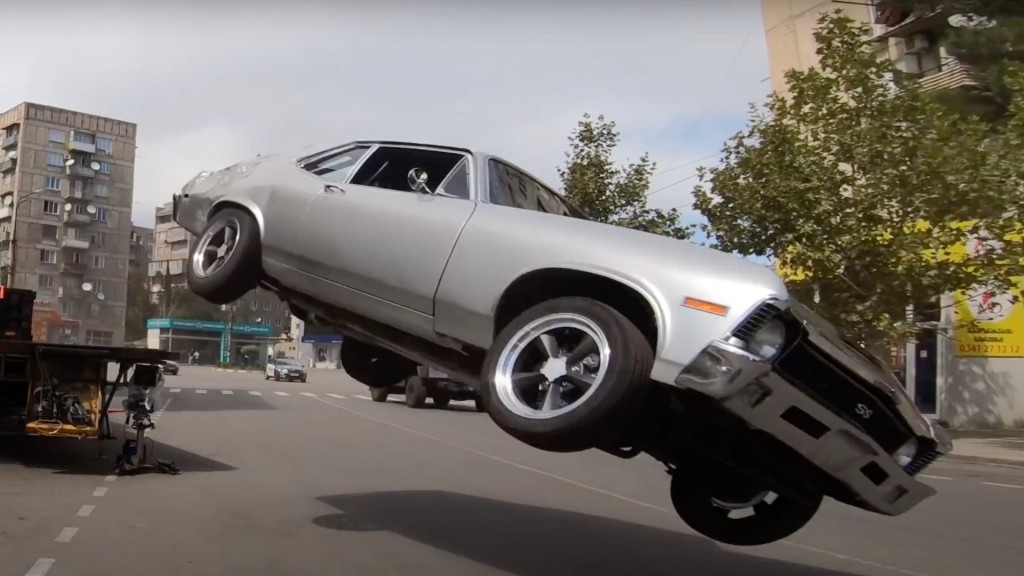If the forward-hinged bonnet doesn’t pique your interest, the presence of a BMW M Power engine certainly will. This tuned Mk1 Golf van is one build which keeps striking with surprising body blows, over and over…
Feature first appeared in Performance VW. Words: Dan Bevis Photos: Matt Woods
In this line of work, we’ve got pretty used to seeing engine-swapped cars. The Mk1 Golf in particular is a tuner favourite for heart transplants – VR6s, 1.8Ts, 16v KRs, ABFs… you name it, it gets shoved in there. But even the most world-weary serial show-goer is given pause when the forward-hinged bonnet lifts on SMD’s tuned Mk1 Golf van. Yes, stop rubbing your eyes, that is a BMW straight-six. An S50 from an E36 M3, no less. And the fact that the van’s running a sodding great motor longitudinally suggests there’s mischief at play throughout the chassis too. You’re right to make these assumptions. But perhaps you’d be surprised to learn just how deep the rabbit-hole goes. You see, this is only pretending to be a Golf; in the same way that an Escort RS Cosworth is only pretending to be an Escort (because, of course, it’s all Sapphire underneath), this retro commercial has been artfully placed upon the guts of an M3. It’s not just the engine – it’s the gearbox, diff, brakes, suspension, the works. So if you’ve seen this thing tearing it up at the Brighton Speed Trials or elsewhere, and had to shut your eyes and shake your head to clear away the troubled voices, fear not: this isn’t a glitch in the Matrix. What it is, in fact, is just about the most astounding retirement present any hard-working van could hope to receive.
Vans, it almost goes without saying, generally have a pretty crappy time of it. Sure, a small percentage get bought by loving owners who pamper and cherish them, but the vast majority are viewed simply as workhorses, blunt instruments, tools to do a job. Cargo gets thrown in with abandon, dents and scratches are a daily occurrence, and when it comes to the end of its useful life, the van gets thrown away. But not this one. No, this Mk1 Golf van has served its time in the realm of commercial usefulness, and is now enjoying its day in the sun, gloriously reborn by the artisans at Southern Motor Developments.

SMD has extensive form with carrying out wild projects like this, and head honcho Brent Crooks is keen to point out that this build has been one of evolution. “It all started out as a very different project,” he explains. “The customer, a carpenter, had bought a very tatty van for work purposes. The standard 1.9 diesel engine wasn’t quite doing it for him, and he had approached us about installing a 1.8T BAM engine. He had already bought a Mk4 Golf GTI donor car to carry out the conversion…” However, the inevitable spectre of mission creep reared its head at this point, as the potential of the engine swap came under analysis. The conversion all started according to plan, with the Mk4 being stripped down for all the required parts and fabrication beginning on the Mk1 to ready it for the BAM heart. With the engine mocked into position, the owner cast a quizzical eye over it and asked Brent what he felt the end result would be like. “Awesome,” was the response, “although a lot of people have done 1.8T conversions, and if it was me I’d want to do something a bit more unusual…”
This sentiment evidently struck a chord, and as the lads glanced around the workshop searching for inspiration, their eyes settled upon the tired and sad-looking E36 M3 sitting in the corner of the yard. It was a real lightbulb moment.

“After some discussion, and a lot of measuring, we decided that it was possible to fit the entire floorpan and all the running gear from the BMW into the Golf,” Brent grins, like the mad scientist he is. “At this point the project basically started again. The Golf’s body was removed from its floorpan, which was reasonably straightforward, but getting the BMW’s floorpan unstitched was a little trickier – although it came out well in the end. The M3’s wheelbase was 280mm longer than the Golf’s, so we had to lose that somewhere; as the Golf was a van, there weren’t going to be any rear seats so we removed a 280mm section of the floor where the rear passengers’ feet would usually be and, after some strengthening was added to the Golf body, the two were married together.”
Oh, simple as that eh? Of course the entire process is way more complex than Brent’s modestly making it sound, as there’s a huge amount of measuring and remeasuring and precise calculation work involved in making a success of a madcap scheme like this. Impressively though, the biggest hurdle the guys encountered was that the rear trailing arm mounts were wider than the Golf’s body. But they managed to get around this without too much drama by widening the lower section of the rear quarters to accept the new floorpan. The SMD method is all about solutions.

“Most of the other fabrication in getting the body mounted to the floorpan was fairly straightforward,” Brent continues. “Additional strengthening was added, as well as a custom half-rollcage. Custom seat mounts were made, and a reverse bonnet opening was achieved using the BMW boot hinges – which worked surprisingly well! The battery box was also fabricated into the floor where the spare wheel in the BMW would have been, and a set of wide Berg Cup wings and rear arches were fitted.” This last flourish serves two purposes: firstly, the extra girth is necessary to accommodate the markedly wider track of the M3. And secondly – well, it just looks great, doesn’t it? And as the build progressed and more and more pieces began to slot into place, it was all starting to appear rather rosy. Until, that is, the owner dropped a bombshell: “He just had too many other commitments, so the project totally lost momentum,” Brent recalls. “We were a bit gutted, as we were worried that the van wouldn’t get finished. But luckily his brother, Piers, decided to take the project on, so the work started again!”
Disaster avoided and with fresh impetus, the SMD team redoubled their efforts. All of the fabrication work had been carried out by this point and it was basically a restoration project, so the whole shell was stripped back down, soda-blasted and painted. All of the original BMW and VW bolts and fixings were re-zinced, the suspension items were stripped down, sand-blasted, repainted and re-bushed, and new brake pipes and fuel lines were made up. When it came to the engine and transmission, everything was fully refreshed to ensure it was all in tip-top condition – new seals, gaskets, boots and everything else one could wish for, along with a lick of paint.

“Once the car was back to the point that it was rolling again with the engine and transmission in place, we fabricated a custom 2.5” exhaust system and made a start on the wiring,” says Brent. “We used the original BMW loom, but cut out any unnecessary wiring. We even managed to retain the BMW ABS system, which was a bonus! The BMW clocks and lighting switches were modified to fit the Golf’s dashboard, so that basically just left us with wiring in the lights. We made a flat floor for the back of the van to keep it looking tidy, and the floor, doorcards and roof where all lined in black. Some additional panels had to be made on the lower section of the dashboard, as well as a steering column cowling, and the interior was finished off with some Corbeau bucket seats and 4-point harnesses.”
Now, you might think that the short wheelbase of the Golf would make it a bit, er, frisky once it’s been amped up to run 320bhp through the rear wheels, but Brent assures us that it’s surprisingly stable: “It’s as wild as you want it to be,” he shrugs. “If you drive it with a little sympathy, it will just hook up and go like a scalded cat, but if you’re a little more aggressive then it will quite happily turn into a drift monster…”

The concept here really is remarkable, and it takes an outfit with the unparalleled expertise of SMD to turn such a notion from the kind of idea that you might sketch out on the back of a beermat into something that actually works in the real world. And not just functions adequately, but works phenomenally well. The idea of shoehorning an M3 inside a tuned Mk1 Golf van is utterly, completely deranged… and yet somehow, thanks to the engineering ingenuity involved here, it makes absolute sense. If you treat the van with respect, it’s friendly enough to use every day. And if you abuse it – well, it’s a short-wheelbase M3, so bonfired rears will be your just reward. And all through the process, the focus on engineering cleverness has been mirrored with an insistence on an impeccable finish. It’s the ultimate fusion of show and go.
“I love seeing people’s reactions to this car,” Brent beams. “I was always worried that we would upset a lot of VW fans as well as BMW fans, however that doesn’t seem to be the case. We often take it to car shows and meetings, and I think the fact that the bonnet opens up the wrong way instantly gets people curious. They tend to come and have a look in the engine bay, then have to step back and take a second look just to confirm that it is a Mk1 Golf!” And that, really, is the ultimate accolade for a project like this. It’s clearly one thing, and yet also quite another; a clever fusion of styles, approaches and eras, taking two entirely disparate entities and making them work as one. It’s not just another engine-swapped Mk1 Golf. It’s a whole new world of retro VW modifying.

Tech Spec: Tuned Mk1 Golf Van
Engine:
BMW E36 M3 S50B32 3.2-litre straight-six, ITG air filter, custom exhaust system, custom radiator setup, E36 M3 gearbox and differential, c.320bhp
Chassis:
17” Rota Grid wheels, 205/40 Goodyear Eagle F1 tyres, E36 M3 brakes – uprated with EBC discs and YellowStuff pads, E36 M3 suspension
Exterior:
Berg Cup wide wings and rear arches, GTI chin spoiler, crosshair headlights, custom front indicators, smoked taillights, custom VW/M badges
Interior:
Custom 4-point rollcage, flush rear floor, Corbeau bucket seats, 4-point Luke harnesses, custom dashboard, OMP steering wheel








